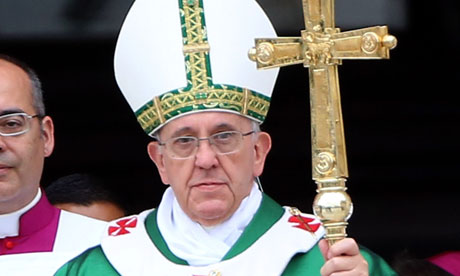Pope Francis to Meet Cardinals for Historic Talks on Church Reforms
By Lizzy Davies
The three-day summit with the cardinals has been billed as a potentially critical moment for Pope Francis’s six-month-old papacy. Photograph: Franco Origlia/Getty Images The eight cardinals picked by Pope Francis to advise him on reform of the Roman curia and the governance of the Catholic church are preparing to meet the pontiff for the first time on Tuesday, in an unprecedented three-day meeting likened to a "papal G8". In a move already billed as a potentially critical moment for Francis's six-month-old papacy, the multinational group of "outsider" cardinals is flying in to Rome from all corners of the globe to present him with ideas for how to reform the Vatican and the church worldwide. The panel – officially named the Council of Cardinals – was hailed as a revolutionary move when it was formed in April shortly after Francis's election. One observer said that, in its apparent embrace of a more collegial style of church governance, it was the "most important step in the history of the church for the past 10 centuries". However, the pope's spokesman, Federico Lombardi, on Monday stressed that the arrangement had its limits. Although the cardinals would be called on to advise the pope and would give the church another "means of consultation", there was no question about who would be having the final say. "A council advises, and he who decides is the pope," he said. The eight cardinals appointed in April by Francis come from all over the world, including the United States, Australia, India and the Democratic Republic of Congo. None has worked in the Vatican's bloated and dysfunctional bureaucracy. All, said Lombardi, were equipped "with great experience of the church's problems in the world". A personal decree known as a "chirografo" issued by Francis said their official task was to advise him on "governance of the universal church" and help him revise the Pastor Bonus, the apostolic constitution on the curia drawn up by Pope John Paul II in 1988. Indications are that that revision could be dramatic and could possibly lead to a new constitution. The charismatic co-ordinator of the council, Cardinal Oscar Rodriguez Maradiaga, the archbishop of Tegucigalpa in Honduras and president of the Caritas Internationalis charity, told Italian television last weekend: "No, that constitution is over. Now it is something different. We need to write something different." Lombardi, however, said "no startling decisions" were expected from this first meeting, which will go on until Thursday afternoon. In his recent interview with the Italian Jesuit journal La Civilta Cattolica, Francis said reform would take time and required a period of "discernment". He also said he was looking to create not "token consultations, but real consultations" with the eight cardinals, several of whom have been outspoken in their criticism of subjects including curial disfunction and the clerical sex abuse scandal. "I want to see that this is a real, not ceremonial consultation," he added, saying the council had been born out of the general congregations in the lead-up to the conclave – meetings in which cardinals from outside the curia voiced extreme concern over its activities. They ended up voting for Cardinal Jorge Bergoglio, an Argentinian who said later he had come "from the end of the world". Throughout the three-day summit, the cardinals will meet with the pope and a secretary in a private library in the apostolic palace. The pope's role will be primarily to listen to what the men have to say, said Lombardi. The main language will be Italian but the cardinals will be able to dip into their native tongue if needed. There will be no interpreters present. All will be staying, alongside Francis, in the Domus Sanctae Marthae guesthouse in the Vatican. Aside Maradiaga, the cardinals are: George Pell, archbishop of Sydney; Sean O'Malley, archbishop of Boston; Laurent Monsengwo Pasinya, archbishop of Kinshasa; Giuseppe Bertollo, governor of the Vatican City state; Francisco Javier Errazuriz Ossa, archbishop emeritus of Santiago; Oswald Gracias, archbishop of Mumbai; and Reinhard Marx, archbishop of Munich and Freising.
|
.
Any original material on these pages is copyright © BishopAccountability.org 2004. Reproduce freely with attribution.
